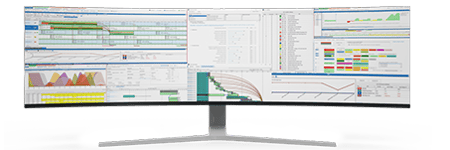Dynamic Scheduling in Pharmaceutical Manufacturing: The Key to Agility and Efficiency
In the complex world of pharmaceutical manufacturing, where stringent regulations and exacting standards define every operation, Production Planners face the herculean task of maintaining seamless workflows. The stakes are high: from meeting fluctuating demand for life-saving drugs to ensuring compliance with Good Manufacturing Practices (GMP), even minor disruptions can cascade into significant issues. Dynamic scheduling, powered by advanced tools like PlanetTogether integrated with enterprise systems such as SAP, Oracle, Microsoft Dynamics, Kinaxis, or Aveva, offers a transformative solution to this challenge.

Dynamic Scheduling
Dynamic scheduling refers to the ability to adapt and re-optimize production plans in real-time as conditions evolve on the shop floor. Unlike static scheduling, which is rigid and often outdated as soon as it is created, dynamic scheduling continuously recalibrates based on real-time data. This agility is particularly critical in pharmaceutical manufacturing, where unforeseen variables like raw material delays, equipment downtime, or regulatory updates can disrupt production.
When integrated with powerful enterprise solutions like SAP or Oracle, PlanetTogether enables dynamic scheduling by bridging the gap between high-level planning and granular execution. The result? Production Planners gain unparalleled visibility and control over their schedules, empowering them to make informed decisions rapidly.

The Importance of Dynamic Scheduling in Pharmaceuticals
Managing Volatile Demand
Pharmaceutical demand can be highly unpredictable, influenced by factors such as seasonal variations, public health crises, and regulatory approvals. Dynamic scheduling allows Production Planners to respond swiftly to these changes by reallocating resources and adjusting production timelines.
For instance, integrating PlanetTogether with Kinaxis enables real-time demand sensing and scenario modeling. This integration ensures that planners can anticipate spikes in demand and align production schedules accordingly, reducing the risk of stockouts or overproduction.
Adapting to Compliance Requirements
Pharmaceutical manufacturing operates under the watchful eyes of regulatory bodies like the FDA and EMA. Any deviation from validated processes can lead to costly recalls and reputational damage. Dynamic scheduling ensures compliance by incorporating real-time data from enterprise systems like Aveva, which provide detailed insights into equipment performance and process parameters.
For example, if a critical piece of equipment fails validation, the integration of PlanetTogether with Aveva’s predictive maintenance tools allows planners to reassign production tasks to validated equipment without disrupting overall workflows.
Optimizing Resource Utilization
Efficient resource allocation is critical in a manufacturing environment characterized by expensive machinery and specialized labor. Dynamic scheduling ensures optimal utilization of these resources by continuously analyzing availability and capacity.
Through integration with SAP’s capacity planning modules, PlanetTogether can dynamically adjust schedules to prevent bottlenecks and idle time. This ensures that every resource is used to its maximum potential while maintaining adherence to production timelines.
![]()

The Role of Integration in Enabling Dynamic Scheduling
Dynamic scheduling doesn’t operate in a vacuum; it thrives on seamless integration with existing enterprise systems. Let’s explore how the integration of PlanetTogether with SAP, Oracle, Microsoft Dynamics, Kinaxis, or Aveva enhances dynamic scheduling in pharmaceutical manufacturing:
Integration with SAP
SAP’s comprehensive suite of tools, including its Manufacturing Execution System (MES) and Advanced Planning and Optimization (APO) modules, provides the foundation for robust planning. Integrating PlanetTogether with SAP enhances these capabilities by enabling real-time synchronization between high-level planning and shop floor execution.
For example, if a batch’s production time exceeds initial estimates, PlanetTogether’s integration with SAP automatically adjusts downstream activities, ensuring that delivery deadlines are met without compromising quality.
Integration with Oracle
Oracle’s Supply Chain Management Cloud offers advanced analytics and demand forecasting capabilities. When combined with PlanetTogether’s dynamic scheduling engine, it enables pharmaceutical manufacturers to create highly accurate and adaptive production schedules.
Consider a scenario where a supplier delay impacts raw material availability. Oracle’s alerts, paired with PlanetTogether’s rescheduling capabilities, allow planners to swiftly reconfigure the production plan to prioritize available materials and maintain workflow continuity.
Integration with Microsoft Dynamics
Microsoft Dynamics’ user-friendly interface and integration with IoT devices make it an ideal partner for dynamic scheduling. When paired with PlanetTogether, it facilitates real-time monitoring of shop floor conditions.
For instance, if temperature deviations occur in a storage area, the integration between Microsoft Dynamics and PlanetTogether enables planners to adjust schedules and prioritize batches unaffected by the issue, ensuring compliance and minimizing waste.
Integration with Kinaxis
Kinaxis’ RapidResponse platform excels in scenario planning and risk mitigation. Integrating it with PlanetTogether empowers Production Planners to simulate multiple scheduling scenarios and choose the most efficient path forward.
For example, during a sudden demand surge for a particular drug, the combined power of Kinaxis and PlanetTogether allows planners to evaluate the impact of various production strategies and implement the most effective one.
Integration with Aveva
Aveva’s real-time monitoring and predictive maintenance capabilities provide valuable insights into equipment health. When integrated with PlanetTogether, these insights drive dynamic scheduling decisions.
If a critical mixer shows signs of wear, the integration enables planners to proactively reschedule production tasks to other available equipment, avoiding unplanned downtime and ensuring consistent output.

Benefits of Dynamic Scheduling for Production Planners
Improved Agility
Dynamic scheduling empowers planners to respond swiftly to unexpected changes, whether it’s a raw material delay or an urgent demand spike. This agility minimizes disruptions and keeps production on track.
Enhanced Collaboration
By integrating with enterprise systems, dynamic scheduling fosters collaboration between departments. Real-time data sharing ensures that all stakeholders—from supply chain managers to quality assurance teams—are aligned.
Reduced Costs
Efficient resource utilization and minimized downtime translate to significant cost savings. Dynamic scheduling ensures that every asset is used optimally, reducing waste and improving profitability.
Increased Compliance
With real-time adjustments and integration with compliance-focused tools, dynamic scheduling helps ensure adherence to regulatory standards, minimizing the risk of costly deviations.
In an industry as demanding as pharmaceutical manufacturing, the ability to adapt quickly and efficiently is not just an advantage—it’s a requisite. Dynamic scheduling, enabled by tools like PlanetTogether and its integration with enterprise systems such as SAP, Oracle, Microsoft Dynamics, Kinaxis, or Aveva, offers Production Planners the agility and precision needed to thrive in this environment.
By embracing dynamic scheduling, pharmaceutical manufacturers can optimize their operations, meet regulatory demands, and deliver life-saving products to market faster. For Production Planners, this means not just keeping up with the pace of change but staying ahead of it.
Are you ready to take your manufacturing operations to the next level? Contact us today to learn more about how PlanetTogether can help you achieve your goals and drive success in your industry.
Topics: PlanetTogether Software, Reduced Cost, Integrating PlanetTogether, Enhanced Collaboration, Optimizing Resource Utilization, Pharmaceutical Manufacturing, Increased Compliance, Adapting to Compliance Requirements





















LEAVE A COMMENT